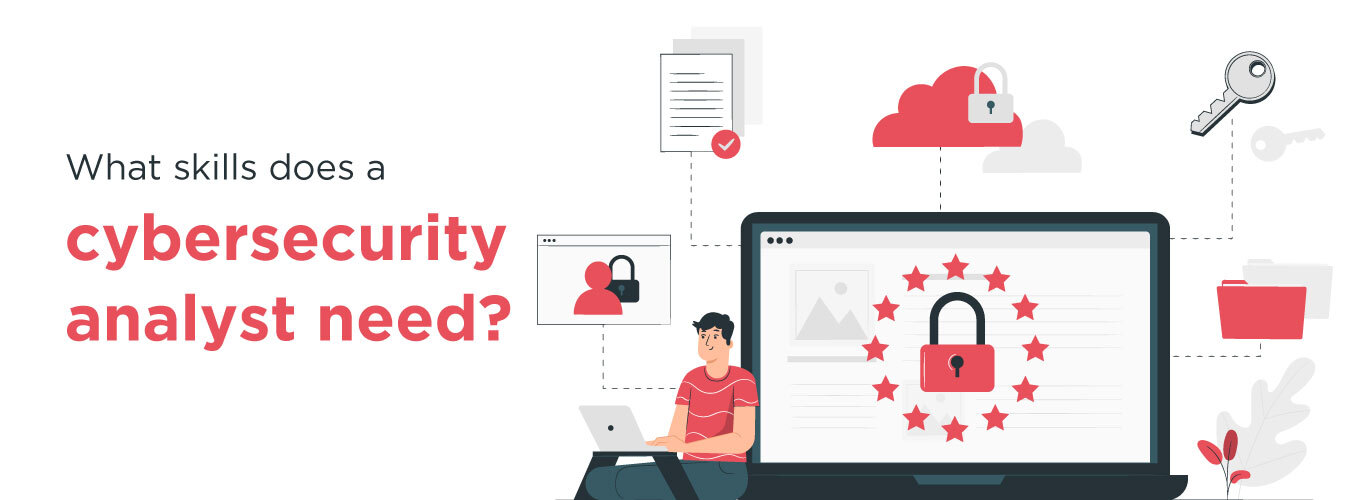7 must-have skills for a Cyber Security Analyst?
The demand for cybersecurity analysts is rapidly growing as the threat of cyber attacks becomes increasingly prevalent. With the widespread use of technology and the growing reliance on digital systems, companies and organizations are in dire need of professionals who can protect their sensitive information and systems from malicious actors. Cybersecurity analysts are responsible for detecting and preventing cyber attacks, developing and implementing security measures, and responding to security incidents. The job market for these professionals is expected to continue growing as the need for secure digital systems becomes more pressing.
A cybersecurity analyst is someone who is responsible for protecting a company’s network and systems from security attacks. This often means that you must have the right technical and workplace skills required for the job. You will have to research upcoming IT trends. Creating contingency plans, reviewing any suspicious activities, reporting security breaches and educating everyone in the company on security breaches. You will also be responsible for implementing protection measures and security controls against threats. To find out where the possible vulnerabilities lie in the organization, you may even have to simulate some attacks and check and find out if things are indeed safe. Cybersecurity analysts need to stay on top of their skills and tools since hackers use new digital weapons to attack.
A cybersecurity analyst has to prepare and plan for a cyberattack. They will need to manage and update all software in the organization and ensure that they all have security measures in them. They will also have to monitor all networks and the activity that takes place in them. They will also have to provide data security practices for employees and compile safety reports and document safety issues. A cybersecurity analyst will also have to research upcoming trends in IT and security and stay updated on all relevant latest information and come up with preventive strategies.
Skills that a cybersecurity analyst will have to develop are as follows:
Networking, scripting and hacking
You will need to have a working knowledge of computer programming languages like C++, Python and Java which will enable you to understand any encoded threats and help you rewrite software if required. You will be required to think like a hacker to prevent cyber-attacks. It is also possible to attend courses in ethical hacking and understand threats and better prevent systems and networks from getting hacked.
Also Read: Cybersecurity: Skills & Opportunity Roundup
Application design and operating systems
A cybersecurity analyst must have functional knowledge of creating an architecture. They must have a clear idea of all platforms and operating system architectures including Windows, iOS, Linux and Android. They must also rewrite code, patch errors and conduct malware analysis and test the entire software development lifecycle.
Firewall installation and insurance assurance
A deep and good understanding of firewall structures will be required to maintain and protect firewalls and network security. An analyst will also need to develop new ways and methods by which an organization’s information can be stored in a safe and secure format. This will ensure that the information systems work well and only when authorized people operate it.
Vulnerability assessment and penetration testing
To establish the vulnerability of a system, an analyst needs to establish levels to those vulnerabilities and if required offer remediation or mitigation. The vulnerability assessment process can be described as follows: Vulnerability identification, analysis, risk assessment and remediation. A cybersecurity analyst can simulate cyber attacks and test the system for vulnerabilities
Also Read: Top 8 In-Demand Cybersecurity Jobs In India?
Decision-making and project management
Cybersecurity analysts have to face very challenging situations and hence they have to think on their feet, propose very unique solutions and have very strong decision making skills to offer the right solutions. They must also have critical and design thinking skills manage complex problems and offer troubleshooting. They have to assist the growth of an organization by reducing the risk of vulnerabilities.
Collaboration and communication
Being in a very unique role, cybersecurity analysts have to work in tandem and synergy with other teams. They will be required to display good teamwork and interpersonal skills. During the course of their job, they will have to interact with many teams that are non-technical and will therefore be required to explain the technical concepts in non-technical terms. Good communication in both verbal and written form will be an important skill to possess.
Stay updated with trends
Cybercrimes such as ransomware, trojan and phishing are common but of late, company networks have been hit by crypto-mining attacks giving access to cyber criminals. To deal with this ever-changing scenario, analysts will have to be willing to learn continuously, adapt to change and be on top of new trends. Security threats are complex, hidden and minute. A tiny threat could initiate a cyberattack and wreak havoc across the organization. Hence, cybersecurity analysts have to be alert and detect the threats before they attack the security walls of an organization.
Takeaway
Organizations need to do everything in their power to maintain the security of their networks and among the first things that they will do is to bring on board a good and qualified cybersecurity analyst. The analyst leads the change, navigates threat and ensures complete data protection. It is not just a specific skill that is required but it also requires a good understanding of the entire landscape. Analysts must keep themselves updated of the latest security tools, technologies, policies and protocols available.










